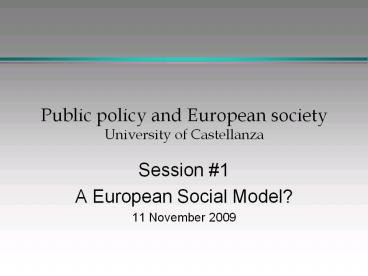Public policy and European society University of Castellanza - PowerPoint PPT Presentation
Title:
Public policy and European society University of Castellanza
Description:
... European Social Model Social citizenship Restrained egalitarianism Backbone state Economic citizenship The EU and the ESM A European Good Thing? – PowerPoint PPT presentation
Number of Views:115
Avg rating:3.0/5.0
Title: Public policy and European society University of Castellanza
1
Public policy and European societyUniversity of
Castellanza
- Session 1
- A European Social Model?
- 11 November 2009
2
Outline
- Welfare state as defining Europe
- Social cohesion and social inclusion
- Elements of the European Social Model
- Social citizenship
- Restrained egalitarianism
- Backbone state
- Economic citizenship
- The EU and the ESM
3
A European Good Thing?
- Europe has built a distinctive economic and
social model that has combined productivity,
social cohesion and a growing commitment to
environmental sustainability. (Kok, 2004 7) - Preserving our European social model - our
specific combination of market economy, welfare
state and democracy - requires action not only at
the European level but also at the global level.
(Lamy, 200418)
4
Inclusion Cohesion
INCLUSION
Vertical axis is about (in)equality
ANOMIE
COHESION
Horizontal axis is about trust and social
capital
ÈXCLUSION
5
Inclusion Cohesion
INCLUSION
Millenarian egalitarianism (BolshevismPol
PotTaliban
Cyber populism
ANOMIE
COHESION
ÈXCLUSION
Claudillo dictatorships China?
Fascism
6
Inclusion Cohesion
INCLUSION
Millenarian egalitarianism (BolshevismPol
PotTaliban
Cyber populism
European Social Model
Scandinavian social democracies
Settler demo-cracies
ANOMIE
UK
COHESION
Continental corporatism
Representative democracies
USA
Medi-terranean familism
ÈXCLUSION
Claudillo dictatorships China?
Fascism
7
Social citizenship
- Education, health, housing, income support
- Rights not charity
- Baseline for participation in society
- Financial costs (taxation)
- Rights means obligations
- Restrictions on diversity (thick citizenship)
8
Egalitarian Europe (1) Income distribution
No European country has such a large proportion
of its population with less than 50 of median
income
The US has a larger proportion of its population
with more than double the median income, but here
Sweden is the outlier
9
Egalitarian Europe (2) Attitudes to inequality
Swe Ger Aus NZ Can USA
It is the responsibility of the government to reduce the differences between people with high incomes and those with low incomes ( agreeing) 53.7 65.5 42.6 53.1 47.9 38.3
Legitimate income difference between unskilled factory worker (income100) and Chairman of a large national company 239 711 480 419 512 1,114
10
Backbone state
- Public realm
- NOT market, NOT personal
- Importance of state service (Beamte, service
public, civil servant) - This social capability is supported by a
conception of the public realm whose underwriting
of public science, public transport, public art,
public networks, public health, public
broadcasting, public knowledge and the wider
public interest gives European civilization its
unique character while offering many of its
enterprises competitive advantage. (Hutton,
2002 258-259).
11
Economic Citizenship
- Labour market regulation
- Employment protection
- Working time
- Health and safety
- Rights to information
- Rights to representation
- Trade union membership
- Trade union coverage
- Workplace representation (Betriebsrat, European
Works Council) - Anti-discrimination
- Equal pay (including pensions, benefits)
- Equal opportunities (recruitment, promotion)
- Work-life balance
- Parental leave
- Right to flexible working
12
Emergence of social Europe
- 1956 Treaty of Rome
- Retraining for those effected by industrial
change - 1974 Social Action Programme
- Response to enlargement 1960s militancy
- Employee rights, equal opportunities
- Maastricht Treaty 1991
- Social Charter of Fundamental Rights of Workers
- 1990s Delors promoting European Social Model
- A market economy, not a market society (Jospin)
- Social expenditure to contribute to
competitiveness - In parallel to single market programme
- 2000 Lisbon Declaration
- The Union has today set itself a new strategic
goal for the next decade to become the most
competitive and dynamic knowledge-based economy
in the world, capable of sustainable economic
growth with more and better jobs and greater
social cohesion - An employment-based social policy
- Intervogernmentalism (Open Method of
Co-ordination) and Soft law - So second thoughts?
13
The EU and the ESM
- Positive integration
- Floor of social and economic rights
- But limited, core remains national
- Negative integration
- Removal national barriers to competition
- Destroying public services?































